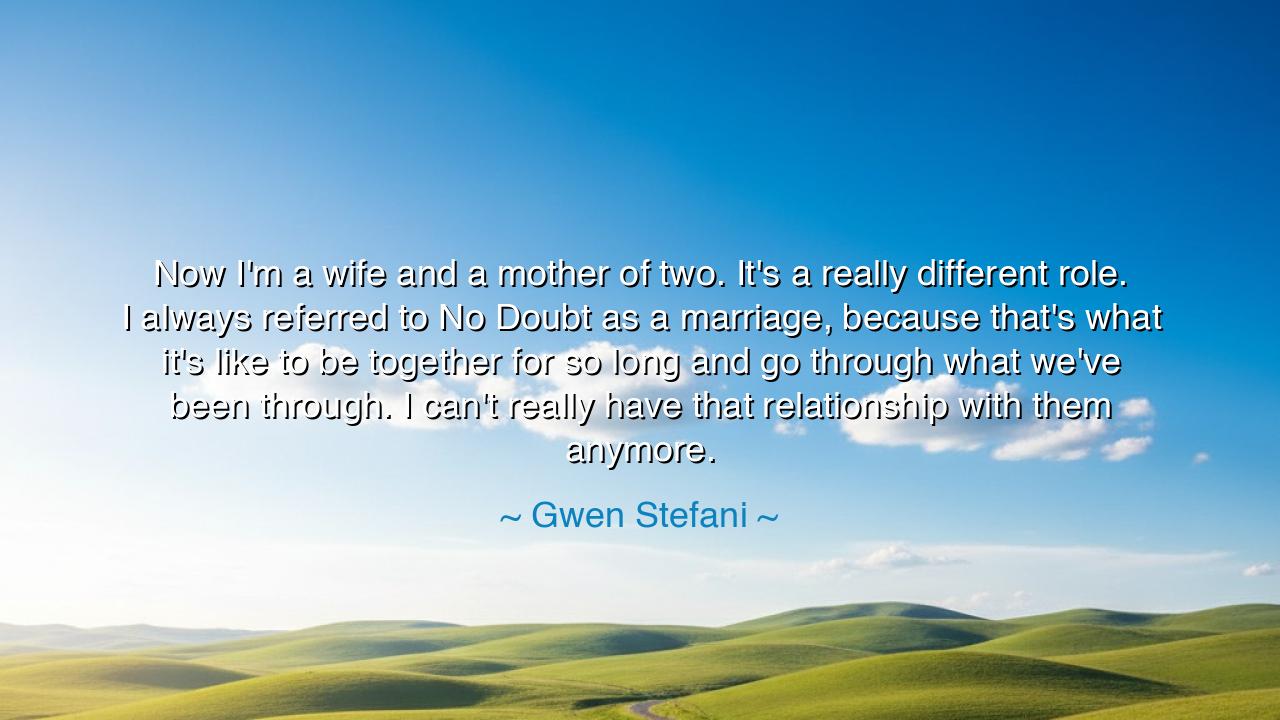
Now I'm a wife and a mother of two. It's a really different role.
Now I'm a wife and a mother of two. It's a really different role. I always referred to No Doubt as a marriage, because that's what it's like to be together for so long and go through what we've been through. I can't really have that relationship with them anymore.






"Now I'm a wife and a mother of two. It's a really different role. I always referred to No Doubt as a marriage, because that's what it's like to be together for so long and go through what we've been through. I can't really have that relationship with them anymore." – Gwen Stefani
In these gentle yet wistful words, Gwen Stefani, the songstress whose voice once carried the fire of youth and rebellion, speaks not as a rock star, but as a woman transformed by time, love, and life. Her reflection, “I always referred to No Doubt as a marriage,” is not a metaphor lightly chosen. It reveals the depth of connection, loyalty, and shared struggle that bound her to her band — a bond forged through years of creation, conflict, triumph, and loss. Yet when she continues, “I can’t really have that relationship with them anymore,” she acknowledges one of life’s most universal truths: that growth, however beautiful, often requires letting go of what once defined us.
The origin of this quote lies in the turning point of Stefani’s life, when the whirlwind of her career with No Doubt, one of the defining bands of the 1990s, began to give way to a new chapter — that of marriage and motherhood. For decades, the band had been her family, her passion, her purpose. Together they weathered success and hardship, fame and fatigue. Theirs was not merely a musical collaboration but a shared existence — much like a marriage, complete with its joys, frustrations, and unspoken understandings. Yet as life shifted, Stefani found herself drawn into a new realm of responsibility and love — the sacred calling of home and family — and in that calling, the nature of her relationships inevitably changed.
The ancients, too, understood this rhythm of transformation. They taught that life unfolds in seasons — that one cannot harvest and plant at the same time, nor dwell forever in spring. The philosopher Heraclitus said, “No man ever steps in the same river twice, for it is not the same river and he is not the same man.” So it is with Gwen Stefani’s reflection. She is no longer the same artist who once stood on stage under blazing lights, nor can she be. For love and motherhood have redefined her, teaching her that creation takes many forms — not only in music, but in the shaping of young lives and the nurturing of a family’s heart. To cling to what was would be to deny what now must be.
There is a poignant echo of this truth in the story of Cincinnatus, the Roman farmer called from his fields to lead the republic through war. He accepted the duty, achieved victory, and then, rather than clutching to his power, returned quietly to his plow. His greatness lay not in his conquest but in his wisdom — in knowing when to step aside and honor the new phase of his life. Gwen Stefani’s evolution mirrors this ancient wisdom: that maturity requires not only ambition, but surrender — the humility to honor change without bitterness, and to bless what must be left behind.
Her words also remind us of the sacred balance between identity and transformation. For Stefani, the band was once her heartbeat — her expression, her refuge, her second family. But in becoming a wife and mother, her purpose expanded beyond the stage. The same energy that once fueled her music now found expression in love’s quieter acts — nurturing her children, supporting her partner, and finding harmony in the simple joys of home. Yet even as she stepped into this new role, she did not renounce her past. Rather, she saw it with gratitude — as one sees a first love that taught the meaning of devotion.
Still, her reflection carries an ache that all who have lived and grown can understand — the sorrow of distance between who we were and who we have become. The relationships that once filled every hour now fade into memory, not through conflict, but through the passage of time. “I can’t really have that relationship with them anymore,” she says, and within those words lies acceptance — the quiet wisdom that not all things are meant to last in the same form. Bonds endure, but they change shape; love remains, but it speaks a different language. To recognize this is not weakness, but grace.
So, my children of time and change, remember this lesson: life’s evolution is not betrayal — it is growth. Cherish each chapter for what it gives you, but do not chain yourself to the past out of fear or nostalgia. The music of your youth may fade, but new melodies await if you have the courage to listen. Honor your former paths — the friendships, the struggles, the dreams that shaped you — but walk forward with open hands, ready to embrace the next rhythm of your soul.
For in the end, Gwen Stefani’s words are not a lament but a benediction. She reminds us that every ending holds the seed of beginning, that love transforms rather than diminishes, and that the heart’s capacity to evolve is the greatest art of all. Whether as artist or mother, creator or nurturer, she teaches that life is a symphony of roles — and that the truest harmony is found not in clinging to one song forever, but in learning to sing anew with every season that comes.






AAdministratorAdministrator
Welcome, honored guests. Please leave a comment, we will respond soon